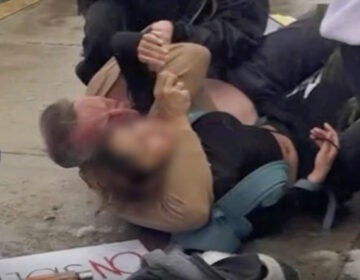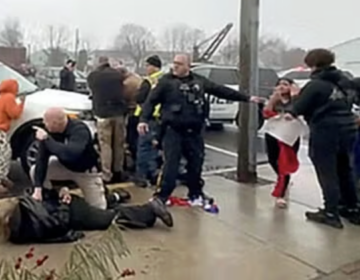Nearly 300 people arrested at U.S. campus protests against the war in Gaza this weekend

Students protest the Israel-Hamas war at George Washington University in Washington, D.C., on Saturday. Protests and encampments have sprung up on college and university campuses across the country to protest the war. (Cliff Owen/AP)
Universities across the country turned to forced removal of pro-Palestinian protests and encampments this weekend as more and more students mounted organized opposition to Israel’s handling of the war in Gaza. On Saturday, more than 275 people were taken into custody on campuses from Arizona to Massachusetts.
Beginning at 11 p.m. Friday night, campus police at Arizona State University — one of the nation’s largest public colleges — started to warn a group of protesters that their gathering on Alumni Lawn was “unauthorized.” After the group refused to leave, campus police arrested 72 people for trespassing by early Saturday morning, according to a university release.
“While the university will continue to be an environment that embraces freedom of speech, ASU’s first priority is to create a safe and secure environment that supports teaching and learning,” the school said in a statement.
Of the dozens arrested, 20% were enrolled students, according to ASU.
More than a 1,000 miles east on the campus of Washington University in St. Louis, another pro-Palestinian protest sprung up on Saturday. Protesters spread out on campus with tents and made calls for more people to join, according to a university statement.
“It quickly became clear through the words and actions of this group that they did not have good intentions,” the statement read. “When the group began to set up a camp in violation of university policy, we made the decision to tell everyone present that they needed to leave.”
When the group refused, campus police arrested 80 people – including Green Party presidential candidate Jill Stein. The Stein campaign confirmed the arrest in a post on X, formerly Twitter.
All those arrested face charges of trespassing and some face charges of resisting arrest and assaulting a police officer, according to Washington University.
More than two hundred miles away at Indiana University, campus police and Indiana State Police arrested 23 protesters at 12:35 p.m. Saturday. A group set up “unapproved temporary or permanent structures” on the campus’s Dunn Meadow and then refused to leave, according to a university statement obtained by NPR.
The nearly two dozen people arrested face charges ranging from criminal trespassing to resisting law enforcement.
“The Indiana University Police Department continues to support peaceful protests on campus that follow university policy,” according to the university statement.
And another 800 miles east at Northeastern University in Boston, state police arrested more than 100 people at a pro-Palestinian demonstration Saturday morning.
Northeastern University officials said they made the decision to arrest protesters after the group erected an encampment on Centennial Commons earlier this week, allegedly used slurs including “Kill the Jews” Friday night, and refused to leave Saturday, according to a post of X.
A video circulating on Instagram seems to have caught the moment when someone said “Kill the Jews” at Northeastern, but it’s unclear who said it. The video was posted by a local socialist and pro-Palestinian group. They claim a pro-Israel counter-protester made the antisemitic call, in what they said appeared to be an attempt to criticize the chants of pro-Palestinian demonstrators.
Despite these four mass arrests on Saturday, pro-Palestinian protests are set continue across the country. In New Brunswick, New Jersey, members of the Rutgers University chapter of Students for Justice in Palestine plan to rally Monday afternoon and demand university divestment, according to a release obtained by NPR.
The debate over the war in Gaza has embroiled campuses for months, but demonstrations were super-charged earlier this month when Columbia University called in the New York Police Department to clear a student encampment. Similar protests have since continued across the nation.
The movement is largely focused on support for people in Gaza and demands that universities divest from companies that profit or support Israel’s war effort in Gaza. But Israeli Prime Minister Benjamin Netanyahu along with prominent U.S. politicians — such as Speaker Mike Johnson and Pennsylvania Senator John Fetterman — have criticized these demonstrations, calling them antisemitic.
On Saturday, Vermont Senator Bernie Sanders told NPR that he disagrees with Netanyahu’s characterization and that these student protests are not inherently antisemitic.
“Look, antisemitism has always existed. It exists today,” Sanders said on All Things Considered. “But to suggest that when you have a significant majority of the American people who, among other things, do not want to support more U.S. military aid to Netanyahu’s war machine, we’re not going to suggest that all of those people are antisemitic.”
On Oct. 7, Hamas-led militants killed 1,200 Israelis and took roughly 240 others hostage, according to Israeli authorities. Israel then launched a war against Hamas inside Gaza. According Gaza’s health ministry, Israel’s military response has killed more than 34,000 Palestinians, a majority of them women and children.
9(MDAzMzI1ODY3MDEyMzkzOTE3NjIxNDg3MQ001))




